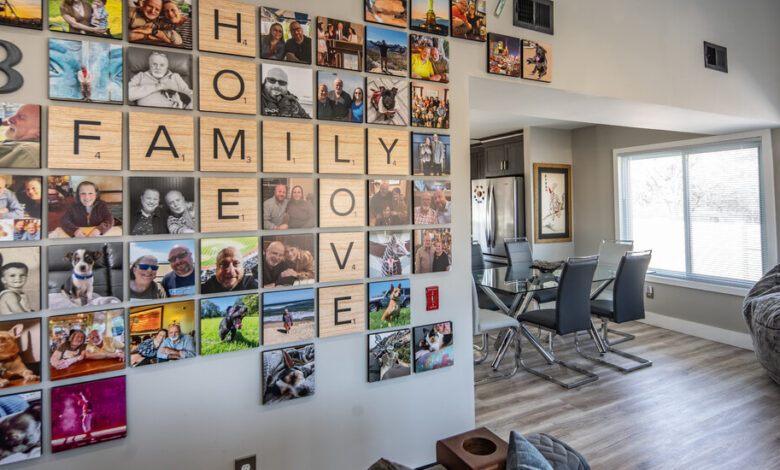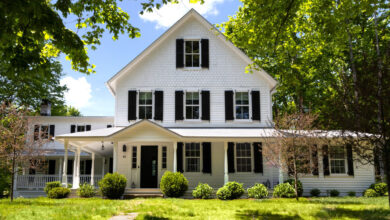Should You Consider Buying Your Childhood Home?

[ad_1]
The stairs creaked in Jen Gorgano’s childhood home. Recalling those sounds makes Ms. Gorgano smile. “Growing up, we would always know who was running up and down the steps by how loud it was,” she said.
The creak is still there. So is Ms. Gorgano. She is in the process of buying the four-bedroom house in Commack, N.Y., from her mother, who now divides her time between Florida and her partner’s Long Island condo.
“Financially it made sense,” said Ms. Gorgano, 25, a speech pathologist, who is buying the house for about $600,000 with her boyfriend and co-buyer Mike Stillman. “My mom gave us a price. It’s less than what she would get if she was selling it to a stranger,” Ms. Gorgano added. “She could sell if for another $100,000. She’s definitely doing us a favor.”
Some first-time buyers are taking the “starter home” idea to another level. They’re purchasing the houses they really did start in: their parents’ houses.
“We’ve seen this more in the last few years,” said Bob Driscoll, a senior vice president and the director of residential lending at Rockland Trust, a bank with branches in Massachusetts and Rhode Island. “The one thing that’s clear in this market is that people have to look at different ways to attain homeownership.”
The typical starter house sold for $240,000 at the end of 2023, up more than 45 percent from prepandemic levels, according to the online real estate broker Redfin. The average mortgage rate was 7.2 percent, compared to 4 percent before the pandemic. (In early February 2024, the rate was 7.15 percent.) Further challenging prospective buyers: new listings of starter homes for sale in the spring of 2023 dropped almost 25 percent from 2022.
“I’m very fortunate to have this opportunity,” Ms. Gorgano said. “Otherwise, I couldn’t afford to buy a house right now.”
The motivation for some of these buyers is to make life easier for their parents. But like many family matters, the dynamics can be complicated. (What’s a fair price? How do the siblings feel about the arrangement?)
Scott Peritzman was a toddler in 1975 when his parents bought a four-bedroom house in Manalapan, N.J. Mr. Peritzman moved out when he was 18, subsequently living in Florida, California, and, most recently, in Princeton Junction, N.J., 30 minutes from Manalapan. Four years ago, he moved back home.
“Mom and Dad had some illnesses and were getting older,” said Mr. Peritzman, now 51, the virtual chief information officer at a tech company. ”I wanted to help them both with finances and with the upkeep of the house. A lot of maintenance needed to be done.”
Not long after returning home, Mr. Peritzman, a perennial renter, broached the topic of buying the house from his parents — but keeping them in residence. “I had looked at new houses, fixer-uppers. It was always with my parents in mind,” he said. “But I didn’t want to move them far from their existing medical community and friends, and I wanted to make sure they didn’t have to move into an assisted living community.
“Ultimately, I decided that buying their house was the best decision,” continued Mr. Peritzman who paid $510,000 and closed on the property in 2022, and has since done a complete renovation.
“My parents treat it as my house, but I don’t want them to feel that way,” he said. “I come from a small family. My sister and I are really close to my parents. They gave us many opportunities when we were growing up and I wanted to do what I could to help them.”
“Some parents are on fixed incomes and their kid’s income is rising, so to have the child buy the house is a perfect solution,” said Mr. Driscoll of Rockland Trust. “It matches everybody’s dream. The parents get money to help them later in life. The child gets to have homeownership.”
Georgeann Wheeler, worked three jobs to hold on to her house, a five-bedroom cape in Hillsdale, N.J.
“This place is her pride and joy. It was her investment,” said Stacie Gallo, 54, the eldest of Ms. Wheeler’s three children. Ms. Gallo, a special-education teacher, and her husband, Nick, a chef, bought the property four years ago. Ms. Wheeler, who’s now 83, still lives there in an apartment converted from the garage.
Early in their marriage, the Gallos were renters in a two-family house in Hawthorne, N.J. Space became increasingly tight when the couple began having children; while trying to save money to buy a place they moved into the Hillsdale house with Ms. Gallo’s mother and stepfather.
“We paid a little rent, but we most paid by helping out,” Ms. Gallo said. “My husband cooked dinner and we did yardwork.” Then, after her stepfather died and her mother became ill, she and her husband got an appraisal of the property — $525,000 — and bought it for $425,000.
“The house is in dire need of renovation, but it does its job for us,” Ms. Gallo said. “And my mother is comfortable here and happy here. I do the food shopping for her, and she has dinner with us every night.”
For some of these first-time buyers, it isn’t simply that the price is right, at least manageable. They’re also holding on to heritage. “This was the first house my parents owned. It’s the first house I’ve owned,” Mr. Peritzman said. “And I get to keep my family’s name in the town where I grew up.”
Jen Gorgano says there is an “extra layer of comfort” that comes with living in her childhood house. “In the past, we did Christmas Eve and Christmas Day with my mom’s family,” she added. “We hope to keep up that tradition.”
[ad_2]
Source link






